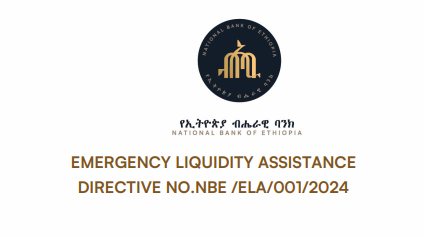The National Bank of Ethiopia (NBE) has introduced a new directive aimed at providing emergency liquidity assistance (ELA) to banks facing temporary liquidity shortages. This directive, titled Emergency Liquidity Assistance Directive No NBE/ELA/001/2024, is designed to ensure the stability of the Ethiopian banking system by mitigating risks associated with unexpected liquidity challenges.
The ELA is intended to offer temporary financial support to solvent banks experiencing short-term liquidity problems. The primary goal is to prevent any illiquidity in individual banks from escalating into broader instability within the banking sector, thereby safeguarding overall banking stability.
Only banks licensed by the NBE, including government-owned institutions, are eligible to apply for ELA. To qualify, these banks must demonstrate solvency, viability, and the ability to meet long-term obligations. Additionally, they must have exhausted other liquidity options, possess a Liquidity Contingency Plan, and maintain adequate eligible collateral.
The directive specifies that eligible collateral includes public debt instruments, NBE debt instruments, corporate bonds, federal government-guaranteed bonds, and other assets deemed acceptable by the NBE. These collaterals must fully cover the loan amount, including any applicable haircut and interest.
Banks seeking ELA must submit a formal written request to the NBE, which must include board approval, details of any maturing obligations, evidence of solvency, an explanation of the liquidity challenges faced, and their Liquidity Contingency Plan.
The maximum duration for ELA is set at six months, with a potential renewal for an additional six months based on the bank’s performance. The interest rate for ELA is established at the overnight standing lending facility rate plus two percentage points.
Banks receiving ELA will be subject to enhanced supervisory oversight and monitoring, which includes regular reporting and compliance checks related to their Liquidity Restoration Plan. While the NBE will not publicly disclose information regarding ELA provisions, delayed disclosures may occur if legal obligations or significant public interest are present.
Additionally, banks that default on their ELA obligations will incur penalties, including a charge equal to the ELA lending rate plus a 5% penalty rate for up to 30 days. If repayment is not made within this period, the NBE may initiate foreclosure proceedings on the collateral.
The implementation of this new ELA directive is part of the NBE’s broader mandate to maintain price and financial stability while supporting the balanced growth of the Ethiopian economy. The directive is set to take effect on October 15, 2024.



















